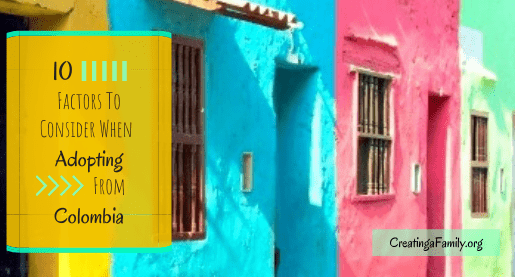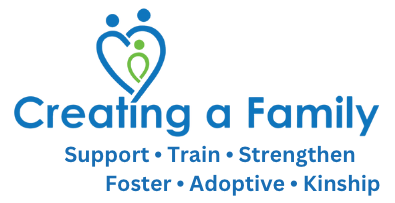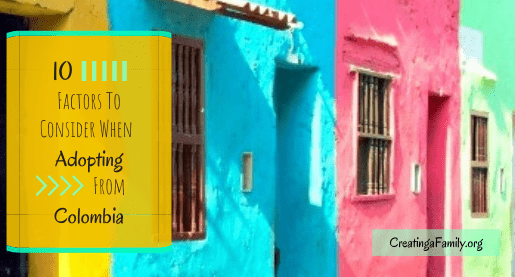
1. The Parents
Applicants must be at least 25 years old but no more than 60 years old, depending upon the child’s age. Parents must be at least 15 years and no more than 45 years older than the child they wish to adopt. The program is open to single women, single men, and same-sex couples.
Singles are eligible to adopt older children or children with identified needs. Single parents can adopt a child of either gender. Couples can adopt jointly, whether married or unmarried, but living together for at least two years, with no more than three divorces. If there is a cancer history, the parent must be five years in remission. Both parents cannot have a history of mental health issues or diagnoses.
Check with a Hague-approved placing agency for further details specific to your case.
2. The Family
There are no restrictions on the number of children already in the home of the receiving family. There are no specific restrictions on annual income or financial status, though the families must meet 1.25 times the U.S. poverty guidelines, as this is a requirement of USCIS in all intercountry adoption cases.
To qualify as a “Colombian Heritage Family,” at least one parent must hold a Cedula based on being born in Colombia or having at least one parent born in Colombia. Check with your adoption agency for more information, including reduced fees for Heritage Families and expedited wait times. Heritage Families can adopt a child(ren) without medical needs.
3. The Kids
The available children at referral typically range from two to fifteen years old. Many of these children, ages eight and up, are deemed “healthy,” and the younger children often have identified medical needs. However, Colombia Heritage Families may adopt younger children without identified needs. Sibling groups are frequently available. Families are not permitted to choose the race of the child(ren) and should be open to being matched with a child of either gender.
Colombian children who wait for adoption represent various ethnic groups, including Latino-Colombian, African-Colombian, and European-Colombian.
While a child is available for adoption from Colombia, he resides in government-run orphanages, foster homes, or private homes supervised by the country’s central adoption authority (Colombian Institute of Family Welfare or ICBF).
Most children in the Colombia program are relinquished or abandoned due to poverty, social stigma, and lack of support for single mothers. Some are removed from their homes of origin due to abuse and/or neglect.
4. The Process
Once you have applied to your chosen, Hague-accredited agency, you will begin the adoption home study process. The home study will include training, interviews, and a home visit. There will also be the submission of documentation, including criminal clearances, child abuse clearances, medical reports, financial statements, reference letters, and more. The agency will submit your home study for approval to USCIS, and dossier preparations can be completed. Your agency will provide specific details of the dossier requirements for Colombia.

Once a dossier is registered for adoption, the Colombian Central Authority will add you to the list of waiting families. It may take anywhere from 12 to 24 months to receive the referral of a child or sibling group (if that’s what you specify). Once your agency reviews and you accept the referral, your agency will process your I-800 forms.
After I-800 approval, the issuance of the Article 5 Letter from the US Government, your completion of the child’s visa application, and the securing of an Encuentro (meeting) date with your child. Adoptive parents who do not hold a Colombian Cedula are required to obtain a special visa that allows them to complete the legal adoption process in Colombia.
The average adoption from Colombia adoptions can take anywhere from 16 to 36 months from start to finish.
5. The Travel
Adoption travel to Colombia starts with a required “integration period” of approximately one week, during which the child stays with the prospective parents to facilitate the opportunity to get to know each other. After the integration meeting, one parent can return to the States if necessary. At least one parent must remain in-country for the final stages of the courts’ adoption process.
Once parents receive the adoption decree, the agency’s attorney obtains a new birth certificate and passport for the child. The final step is to obtain a US visa for the child to return home to the US. Most adoption trips to Colombia take a total of 3-6 weeks for the adoption process to be completed.
Families who have hosted a child from Colombia may have their adoptions expedited.
6. The Program
Colombia’s adoption program is becoming increasingly popular, and the number of children adopted over the last five years is rising. Colombia is a Hague Treaty participant. In 2022, there were 235 children placed for adoption. This compares to 297 in 2021, 137 in 2020, and 244 children in 2019. In 2022, approximately 47% of the children were boys, and 53% were girls.
7. The Cost
The Median Adoption Service Provider Convention Fee for 2022 was $41,432.00, according to the US State Department’s FYE 2022 Annual Report. This may not include documentation and notarizations required for a dossier or education fees. Families should expect their total cost to range from $25,000 – $45,000 plus travel expenses.
8. The Needs
In Colombia, children of all ages need families, including sibling groups and children living with identified needs ranging from minor/correctable to lifelong needs.
The more commonly seen needs include general or unknown developmental delays, neurological disorders, behavioral disorders, and physical disabilities. Your agency will have lists of specific needs and issues related to those diagnoses to review.
9. The Post-Adoption Reports
According to the US Department of State resources on adoption from Colombia, agencies and adoptive parents are responsible for complying with this post-adoption report schedule.
For adoptions completed on or after August 12, 2021, Colombia requires post-adoption reports as follows:
Children up to age 7 years, 11 months (at time of adoption court order): 4 reports total at six-month intervals after adoption.
Children aged 8 years and above (at time of adoption court order): 6 reports total at six-month intervals after adoption.
The reports will be written by your social worker from your local adoption agency after a visit to you and your child. All post-adoption reports must be apostilled before submission to Colombia. Many agencies will provide these reports as part of their adoption provider services. Please inquire with your agency or home study provider about this process and the financial aspects of those services.
These reports must include your child’s developmental progress and pictures. Post-adoption reports are a serious commitment, as The Hague Convention also requires compliance.
Creating a Family always urges families to comply with post-adoption requirements in a timely manner. Your cooperation contributes to the program’s stability and adds to Colombia’s history of positive experiences with US-citizen parents.
10. The Additional Resources
The following additional resources can help you learn more about adoption from Colombia:
- US Department of State Intercountry Adoption from Colombia
- US Department of State Annual Report FY22 on Intercountry Adoption
- US Department of State Adoption Statistics
- Creating a Family’s International Adoption Resource page
- Children’s Home Society/Lutheran Social Services Adoption from Colombia
- Children’s House International Colombia Adoption Program
This information is current as of September 2023 and represents our best estimates and approximations only. Depending upon your individual circumstances, even the widest ranges can vary greatly. Please always refer to your chosen adoption service provider for specifics regarding your process.
This information is subject to change; therefore, check with an agency approved to place from this country for the most current information.
© Creating a Family
Image credit: McKay Savage; Aleix Cabarrocas Garcia

